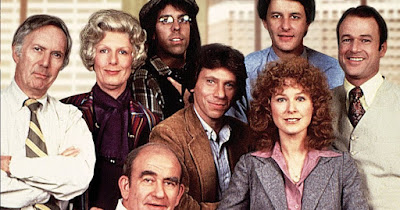Halloween celebrated the
fun part of being scared. But there are some fears that have no place in such a
colorful, festive holiday.
Nuclear war is not a prevalent
topic in the Comfort TV era for obvious reasons (“Will a nuclear winter finally
give Jack a chance to cuddle up with Chrissy? Find out on tonight’s Three’s Company!”) But it did get a
high-profile treatment in the 1983 TV movie The
Day After. Back then the Emmy-winning film was considered such a landmark
event that it was shown in American schools.
Much of The Day After focused on what happens in
the aftermath of an attack. It left an impression on me as it likely did on
anyone who saw it. But there was an episode of Lou Grant that aired one year earlier that I found even more
unsettling. Its title was “Unthinkable.”
The story opens with a
school bus crash that puts one student into a hospital burn unit – just one of
those typical, terrible things that happen almost every day in a major city
like Los Angeles. But then the drama shifts from a small-scale tragedy to one
that threatens the entire nation.
Lou Grant first figures
something serious is happening when a congressman is suddenly called out of a
lunch Lou attends with his publisher. He heads back to the newspaper to learn
that the death of a king in a Persian Gulf country has left a power vacuum, and
the U.S. and Russia are both trying to fill it, in part to secure the oil
supply that flows from that nation.
“We’ll show a little muscle,
is all,” Lou says.
But subsequent events are
more ominous: The President changes his travel plans. A Russian jet shoots down
a U.S. plane. An oil tanker is fired on. Troops mass on the Middle Eastern nation’s
border. California hospitals are put on alert.
The most frightening aspect
of the story is how plausible each of these steps seems as the world moves
closer to the brink of Armageddon. Everything that happens in “Unthinkable” has
happened more than once in our real world.
And as unimaginable
consequences gradually become more imaginable, the writers, editors and
photographers at the Los Angeles Tribune
do their jobs as the professionals they are, covering this potentially horrific
story from every angle – medical, military, civil defense, even technology
(with phone and computer lines vaporized, communication would be completely cut
off).
Grim numbers are collected
– one bomb dropped on L.A. would immediately kill two million people; at any
given moment, we are a half-hour away from annihilation.
In the midst of this,
Animal interviews a man who has maintained a bomb shelter in his backyard for
30 years – which he now shows off with pride.
“You sound like you’re
almost looking forward to it,” he says of the potential attack.
“Well,” the man replies,
“it’s nice to see your investment pay off.”
And what about that scene
with the student in the burn unit? It’s there so Billie can interview the
girl’s doctor, who describes the awful effect of severe burns, which survivors
of a nuclear attack would experience. From how they are described, many viewers
will be with Animal when he says if the big one drops, he’d rather be standing
right under it.
The show’s ending was not
what I expected. Obviously they were not going to vaporize Los Angeles, since
there were still a few episodes left in the season. But they also didn’t want
to minimize the crisis with a “See, it was all for nothing” climax. Some may
not find it satisfying how they resolved that impasse, but the episode’s
message loses nothing from that decision.
Yes, you can sense Ed
Asner’s politics informing the script. “Unthinkable” airs late in the series’
fifth and final season, and CBS probably would have picked it up for at least
one more had the network not grown tired of his activism.
But as someone who
doesn’t share many of his views, I can still respect them when they are fairly
and intelligently presented. Nothing that happens in the episode seems
exaggerated or alarmist.
That’s one reason this tale
stuck with me. The other reason is one I experience every time I return to this series: its poignant reminder of how journalism is supposed to work. The
only thing more horrifying than contemplating the events described in
“Unthinkable” is contemplating how they would be covered now by…well, feel free
to insert your least favorite newspaper or cable news network here.






Mr. Hofstede, have you read Todd Gitlin's 1983 book "Inside Prime Time"? It brought up the "Lou Grant" episode in question.
ReplyDeleteI have not. I'll check it out.
DeleteFair warning: As far as the book is concerned, I can't say that Mr. Gitlin held the original "Charlie's Angels" TV series in high regard.
Delete